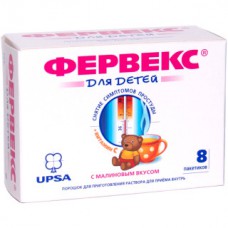Expiration date: 04/2026
Active substances: paracetamol, ascorbic acid, feniramina maleate
excipients: sucrose, citric acid anhydrous, acacia gum (Arabian gum), sodium saccharinate, raspberry flavor
Description of dosage form
Lemon with sugar: light beige powder with a characteristic smell. Allowed blotches of brown color.
Pharmacodynamics
Combined preparation.
Paracetamol has analgesic and antipyretic effect, which is due to its effect on the center of thermoregulation in the hypothalamus, eliminates headaches and other types of pain, reduces fever.
Ascorbic acid (vitamin C) is involved in the regulation of redox processes, carbohydrate metabolism, blood clotting, tissue regeneration, synthesis of GCS, collagen and procollagen, normalizes capillary permeability. Increases the body's resistance, which is associated with the stimulation of the immune system.
Phenyramine-a blocker of H1-histamine receptors-reduces rhinorrhea, nasal congestion, sneezing, watery eyes, itching and redness.
Pharmacokinetics
Fervex for children
Paracetamol. Paracetamol absorption is complete and fast. Peak plasma concentration is achieved 30-60 minutes after administration. The distribution of paracetamol in tissues is rapid. Comparable concentrations of the drug in blood, saliva and plasma are achieved. Plasma protein binding is low, 10-25%. Penetrates through the BBB.
Metabolism occurs in the liver, 80% enters into conjugation reactions with glucuronic acid and sulfates to form inactive metabolites, 17% undergoes hydroxylation to form 8 active metabolites, which conjugate with glutathione to form already inactive metabolites. With a lack of glutathione, these metabolites can block the enzyme systems of hepatocytes and cause their necrosis. The CYP2E1 isoenzyme is also involved in the metabolism of the drug. T1 / 2-1-4 h. Excreted by the kidneys in the form of metabolites, mainly conjugated. Less than 5% is displayed unchanged.
Feniramina maleate. Well absorbed in the digestive tract. T1 / 2 of the blood plasma is 1-1. 5 h. Excreted mainly through the kidneys.
Ascorbic acid. Well absorbed in the digestive tract. Tmax after oral administration-4 hours. Metabolized mainly in the liver. Excreted by the kidneys, through the intestines, with sweat-unchanged and in the form of metabolites.
Indications of the drug Fervex
Fervex
Acute respiratory viral infections (symptomatic therapy), rhinopharyngitis.
Fervex for children
Short-term treatment of conditions accompanied by fever and runny nose in colds, rhinitis and rhinopharyngitis of infectious-inflammatory and allergic nature in children from 6 to 15 years.
Contraindications
Fervex
- hypersensitivity to paracetamol, ascorbic acid, Pheniramine or any component of the drug,
- erosive and ulcerative lesions of the gastrointestinal tract (in the acute phase),
- renal failure,
- portal hypertension,
- alcoholism,
- deficiency of the enzyme glucose-6-phosphate dehydrogenase,
- children's age (up to 15 years),
- pregnancy (I and III trimester) and lactation.
With caution-liver failure, angle-closure glaucoma, prostatic hyperplasia, congenital hyperbilirubinemia (Gilbert, Dubin-Johnson and Rotor syndromes), viral hepatitis, alcoholic hepatitis, old age.
Fervex for children
- hypersensitivity to one of the components of the drug,
- severe impairment of liver and kidney function,
- blood disease,
- deficiency of the enzyme glucose-6-phosphate dehydrogenase,
- pregnancy (I and III trimesters), lactation,
- children's age (up to 6 years).
With caution-benign hyperbilirubinemia (including Gilbert's syndrome), impaired liver or kidney function, diabetes mellitus.


